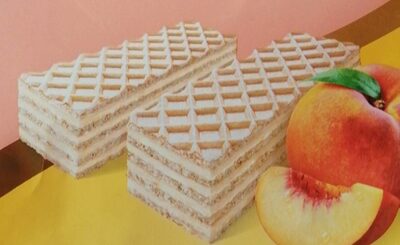
Barcode: 9000331628363
Pfirsich Sommerglück
HALAL
📝 Reason: All ingredients in ‘Pfirsich Sommerglück’ are Halal, except ‘natural flavors’, which is doubtful as the exact source is unlisted. Most components, such as wheat flour, sugars, vegetable fats, and permitted E-codes (E160a) are considered Halal by organizations like IFANCA. In Islam, doubtful ingredients should be avoided unless certified (Quran 5:3).
🏷️ Category: Snacks, Sweet Snacks, Biscuits And Cakes, Biscuits And Crackers, Biscuits, Wafers
📄 Certificates: Vegetarian, Vegan, Vegetarisch
Ingredients:
Details
Is Pfirsich Sommerglück Halal?
The quest for delicious snacks that align with Halal dietary guidelines can be challenging. Today, we explore the Halal status of Pfirsich Sommerglück, a sweet snack that has garnered attention for its unique taste and appealing ingredients. According to the information received, Pfirsich Sommerglück is officially declared Halal. However, as with any product, it’s essential to examine its components and potential concerns more closely.
Understanding the Ingredients
Pfirsich Sommerglück contains a mix of ingredients, primarily consisting of:
- Sugar
- Wheat flour
- Vegetable fats (coconut, palm)
- Glucose syrup
- Peach powder (1%)
- Natural flavors
- Acidulant: citric acid
- Lemon juice concentrate
- Emulsifier: lecithins (soy)
- Leavening agent: sodium bicarbonate
- Salt
- Colorant: E160a (Beta-carotene)
Ingredient Breakdown
Let’s dive deeper into the Halal status of each ingredient:
Sugar
Regular refined or raw sugar is generally Halal, unless it is processed with bone char, which is rare in regions like the EU and US. Source.
Wheat Flour
This ingredient is derived from plants and is considered Halal as no animal-derived processing agents are used. Source.
Vegetable Fats (Coconut, Palm)
Both coconut and palm oils are plant-derived and classified as Halal. Source.
Glucose Syrup
This syrup is frequently derived from corn or wheat and regarded as Halal unless stated otherwise. Source.
Peach Powder (1%)
Being a fruit powder sourced from plants, it is entirely Halal. Source.
Natural Flavors
This ingredient poses a concern due to its unclear origin; it can be derived from either plants or animals. In Islam, ingredients with ambiguous sources should be avoided unless they hold a certification. Source.
Citric Acid
Commonly produced from the fermentation of sugars or citrus fruits, citric acid is Halal. Source.
Lemon Juice Concentrate
This concentrate is derived from lemons and is Halal as well. Source.
Lecithins (Soy)
Lecithin extracted from soy is plant-based and Halal. Source.
Sodium Bicarbonate
This leavening agent, being of mineral origin or synthetic, is Halal. Source.
Salt
Sodium chloride is of mineral origin and considered Halal. Source.
Colorant: E160a (Beta-Carotene)
This colorant can be derived from plant sources or synthetically made; it is Halal. Source.
Conclusion
In conclusion, Pfirsich Sommerglück is predominantly made up of ingredients classified as Halal, with the major concern being the unclear source of natural flavors. For Muslims adhering to a Halal diet, it is advisable to avoid products where such ambiguity exists unless they are certified Halal. Pfirsich Sommerglück also carries several vegan and vegetarian certifications, making it a versatile snack choice in today’s market. Always check for certifications or more detailed ingredient sourcing for your peace of mind!
